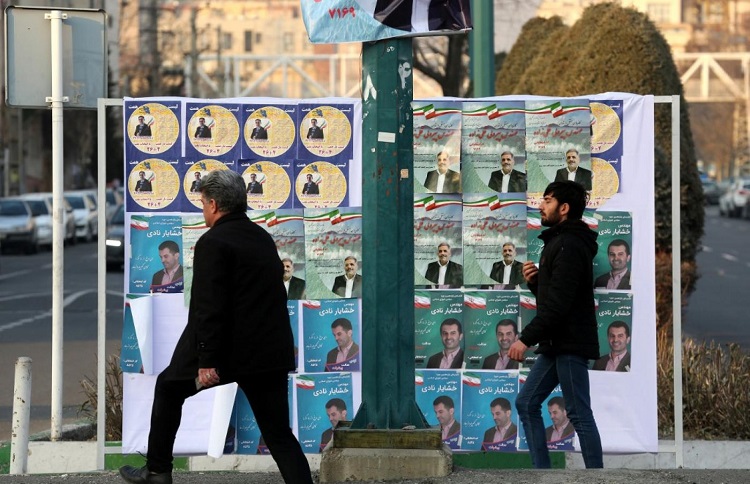
By Jubin Katiraie
On February 10, a day before the anniversary of the establishment of the Iranian regime, so-called reformists suddenly acquiesced to the supreme leader Ali Khamenei’s demand for participating in upcoming elections on February 21.
Allies of the regime’s president Hassan Rouhani previously announced that they wouldn’t nominate any candidate for the parliamentary elections. They warned rival faction about wide disqualifications and threatened that “the elections will be cold,” if the Guardian Council doesn’t qualify “reformist” candidates.
However, pro-Rouhani factions eventually backtracked without receiving anything in return. The reformists’ acquiescence to Khamenei revealed that this movement lacks public acceptance and its leaders pursue to only share in power rather than solve the people’s problems, which caused unprecedented protests in November.
On the other hand, so-called moderates proved that they are complicit in all the crimes of the regime against the people including the murderer more than 1,500 protesters who flooded into the streets in November for their most basic rights.
Threats of Pro-Khamenei Faction Against Reformists
On February 12, Tehran’s constituency governate released the names of qualified candidates in this constituency. Notably, the list includes none of the prominent reformists that were disqualified by the Guardian Council.
Additionally, the secretary of the Guardian Council Ahmad Jannati indirectly slammed regime president Hassan Rouhani form making remarks about the elimination of competitive elections by disqualifying reformists. “Contrary to several misconceptions, elections are quite competitive. Representatives of all factions are present in the election,” Jannati said in an interview with the state-run TV Channel One on February 12.
Subsequently, the state-run TV reported, “The secretary of the Guardian Council urged [candidates] to avoid disappointing the people, demonizing, humiliating the rivals, infringement of advertising rules, and false and deceitful claims.”
On the other hand, the Political Deputy Minister of Interior Affairs Jamal Orf showed that Rouhani’s faction has succumbed to the Guardian Council’s list. “7,148 candidates have been qualified and 7,296 others disqualified,” ISNA news agency quoted Orf as saying as the authority responsible for holding elections on February 13.
In response, Laya Joneydi, the judicial deputy of the president, announced, “The draft of referendum bill over the expediential supervision [related to the Guardian Council’s supervisory] has been prepared.” She also threatened the pro-Khamenei faction about the possibility of the bill being approved by commenting that “the bill will be discussed by the current parliament.”
However, Khamenei’s appointees came in the public and bluntly threatened Rouhani and his allies about the consequences of new protests.
“We don’t sit idly before sedition; [reformists] should be ready for harsh blows if they pursue riot,” the state-run website Entekhab quoted the head of plainclothes and the notorious IRGC’s intelligence branch Hossein Taib as saying on February 13.
In addition, the head of Judiciary Ebrahim Raisi said, “Everyone who questions [the credit of] the elections is a traitor.” Earlier, the Attorney-General Mohammad Jafar Montazeri unveiled Khamenei’s intent for sweeping rivals. “Jihadi management and Majles are the sole solutions for problems [of the country],” Montazeri said on the 41st anniversary of the Iranian revolution.
Now, the question is that can the regime overcome the elections’ massive crisis or will the mullahs temporarily succeed to circumvent it?
The evidence says that the Iranian regime could cease the crisis for a limited time, however, the infighting and power war hasn’t ended despite reformists’ surrender.
In truth, Rouhani and his gang were compelled to accept Khamenei’s path in fear of the emergence of a new round of protests. However, these conditions won’t lengthen forever due to economic problems and a deep rift between the people and the rulers.
Read more:


